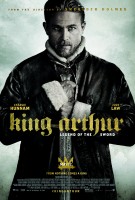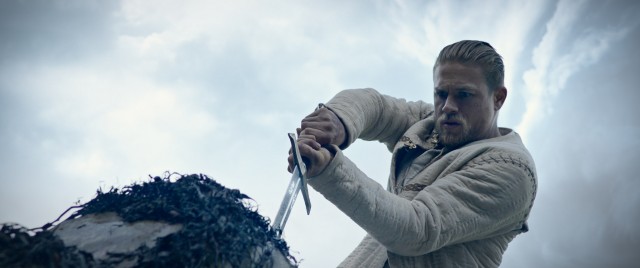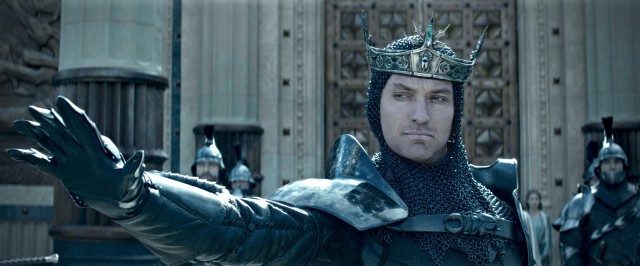King Arthur: Legend of the Sword Movie Review
 |
King Arthur: Legend of the Sword
Theatrical Release: May 12, 2016 / Running Time: 126 Minutes / Rating: PG-13 Director: Guy Ritchie / Writers: Joby Harold (story & screenplay); Guy Ritchie, Lionel Wigram (screenplay); David Dobkin (story) Cast: Charlie Hunnam (Arthur Pendragon), Astrid Bergès-Frisbey (The Mage), Jude Law (Vortigern), Djimon Hounsou (Bedivere), Eric Bana (Uther Pendragon), Aidan Gillen (Goosefat Bill), Freddie Fox (Rubio), Craig McGinlay (Percival), Tom Wu (Chinese George), Kingsley Ben-Adir (Wet Stick), Neil Maskell (Back Lack), Annabelle Wallis (Maggie), Zac Barker (Young Arthur - 2 Years), Oliver Barker (Young Arthur - 2 Years), Geoff Bell (Mischief John), Poppy Delevingne (Igraine), Millie Brady (Catia), Nicola Wren (Lucy), Wil Coban (Brothel Blackleg), Bleu Landau (Blue), Jacqui Ainsley (Lady of the Lake), Lorraine Bruce (Syren 1), Georgina Campbell (Kay), Rob Knighton (Mordred), Michael Hadley (Mage King), David Beckham (Trigger), Katie McGrath (Elsa), Alan Turkington (General 1), Peter Ferdinando (Earl of Mercia), Michael McElhatton (Jack's Eye), Mikael Persbrandt (Greybeard) |
Though his name was known in many circles on the basis of his first two movies (and in others for his marriage to Madonna), British filmmaker Guy Ritchie was something of a niche brand until helming 2009's blockbuster Sherlock Holmes and its nearly as successful 2011 sequel. King Arthur: Legend of the Sword is absolutely intended to be a summer blockbuster, though I would be very surprised if it turns into one. Thirteen years ago, in between the first two Pirates of the Caribbean films, mega producer Jerry Bruckheimer tried to make a cool new King Arthur for the masses, with Keira Knightley as a midriff-baring, arrow-slinging Guinevere. It bombed to an almost staggering degree stateside. Ritchie's movie cost "only" $102 million, a little less than Bruckheimer's even ignoring inflation. As usual, a big budget is no substitute for good ideas. Ritchie's Arthur has lots of ideas and they range from pretty bad to horrid.
A prologue set in Londinium establishes a king (Eric Bana) and Vortigern (Jude Law), his conniving, usurper of a brother, who has colluded with the Mage, magician folk, to spark a war that puts him in the throne. We are then introduced to our hero, a goateed blonde vagabond (Charlie Hunnam) who was supposedly born in a brothel. He is something of a forebear to Robin Hood, standing up to those up to no good, even scary Vikings with braids. When his forearm is discovered to be lacking a branding, the future King Arthur must join the masses who are to systematically attempt to pull a seemingly immovable sword from a stone to fulfill a prophecy. Of course, Arthur does it, to everyone's amazement (well, not ours).
With his feat instantly becoming legend, our evil King arranges to have the humble Arthur beheaded. But that, of course, is not how this story goes. Arthur escapes and joins up with other outlaws, including Sir Bedivere (Djimon Hounsou), master archer Goosefat Bill (Aidan Gillen), and a cloaked, unnamed young Mage woman (Àstrid Bergès-Frisbey).
Part of the time, Ritchie, who shares screenplay credit with Harry Potter executive producer/Man from U.N.C.L.E scribe Lionel Wigram and lapsed filmmaker Joby Harold (the 2007 thriller Awake), applies the Sherlock Holmes treatment: the cloudy gray visuals, the slow-motion fight sequences, the irony-heavy anachronistic sense of humor. It's not nearly as effective or appealing here, mainly because instead of the charming buddy comedy of Sherlock and Watson, we get a brooding hero and a band of rogues we never even slightly warm to.
The movie flirts with camp status repeatedly, as when an octopus made of human women reminds Vortigern of the terms of his deal or a giant, destructive snake crashes a tense scene. The final showdown leaps wholeheartedly into unsalvageable and removes any doubt from what you've been thinking up until now. That this movie is a mess, one that wants to be like 300 and Clash of the Titans, but falls short of those low benchmarks while being decidedly bad in its own right.
King Arthur is so consistently misjudged that it makes me wonder if my appreciation of Ritchie's Sherlock movies would stand up to new viewings. But I am pretty sure that those were both stronger in the two areas of greatest importance to me: story and characters. While the budget ensures this looks like a major studio film, too often, it feels like syndicated television. Fault for that primarily lays at Ritchie's feet, but there's enough blame to pass around. Hunnam, best known to many for FX's "Sons of Anarchy" (though I'll always identify him with "Undeclared"), does not ooze charisma in what could be his breakout role after dropping out of Fifty Shades of Gray. But there isn't much you can do with a movie that uses hyper editing and one long stretch of heavy post-action breathing to draw its biggest (and only) laughs.
|
Related Reviews:
DVDizzy.com | DVD and Blu-ray Reviews | New and Upcoming DVD & Blu-ray Schedule | Upcoming Cover Art | Search This Site
DVDizzy.com Top Stories:
Now in Theaters: Guardians of the Galaxy Vol. 2 • The Fate of the Furious • Risk
King Arthur • The Sword in the Stone • Camelot: The Complete First Season • Unidentified Flying Oddball
Directed by Guy Ritchie: Sherlock Holmes • Sherlock Holmes: A Game of Shadows • The Man from U.N.C.L.E.
Charlie Hunnam: Pacific Rim | Jude Law: Contagion • Genius • The Grand Budapest Hotel
Eric Bana: The Other Boleyn Girl • The Finest Hours • Funny People • Lone Survivor
The Legend of Tarzan • Red Riding Hood • 300: Rise of an Empire • Gods of Egypt
Text copyright 2017 DVDizzy.com. Images copyright 2017 Warner Bros. Pictures. Unauthorized reproduction prohibited.

